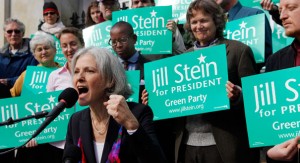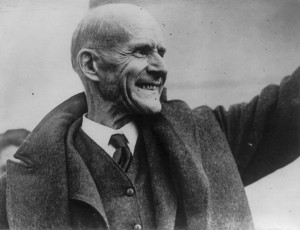Howie Hawkins is a veteran activist, working Teamster and leader of the Green Party nationally and in his home state of New York. Last November, his campaign for governor against incumbent Democrat Andrew Cuomo won 176,000 votes, nearly 5 percent of the total – the most successful left-wing independent campaign in New York since 1920. Hawkins wrote an article for Socialist Worker about the debate on the left surrounding the Bernie Sanders campaign which criticized Socialist Alternative’s approach.
Below is a response from Bryan Koulouris, Socialist Alternative’s national organizer.
The Bernie Sanders campaign for President is gaining more traction than anybody expected. This reflects the massive, widespread hatred of Wall Street, the frustration at big business domination of the political system and the openness to socialist ideas in US society. Sanders’ rallies have constantly necessitated bigger venues than organizers planned. Thousands are being turned away at the doors from New Hampshire and Iowa to Colorado and Minnesota. Polls show Sanders’ support skyrocketing, putting him within ten percentage points of Hillary Clinton in state after state.
Socialist Alternative stands for building a new, mass working people’s party. We disagree with Sanders’s approach of running in the Democratic primary. However, we also think it would be extremely foolish for the left to not recognize the enormous significance and potential inherent in the hundreds of thousands of people rallying around his campaign looking to fight against corporate America.

The thousands of people getting involved in the Sanders campaign are often new to activism and angry at the massive inequality in society. They are disgusted with the potential prospect of having former WalMart executive Hillary Clinton running as the “lesser evil” against arch-reactionary Scott Walker or yet-another-Bush. Yet Sanders has stated that if he loses the primary – which we believe he will – he will endorse the Democratic nominee for president, most likely Hillary Clinton. This is consistent with his previous record of endorsing the Democratic nominee for president.
These two factors – Sanders’ decision to run as a Democrat and the anger at big business that he is giving voice to – is the basis of the deep contradiction running throughout the Sanders campaign. On the one hand, there is the danger that Sanders channels the radicalizing workers and young people gathering behind him into Hillary Clinton’s pro-corporate campaign and helps to legitimize the Democratic Party to those who are most critical of corporate politics.
On the other hand, the Sanders campaign is drawing together potential raw material for independent working class politics in the form of the hundreds of thousands who are supporting him precisely because they see him as a clear alternative to establishment politicians and big business policies.
We believe socialists have an obligation to connect up with this radicalizing audience and struggle to make sure they don’t get trapped within the Democratic Party and instead win them over to the need for independent politics and building movements that can change society. To be effective in building support for socialist policies and independent working class politics we must address consciousness as it actually exists rather than as we wish it would be.
With this in mind Socialist Alternative has greeted the radical, anti-corporate, working class platform of Sanders. At the same time we have explained that the Democratic Party is a dead end for all those seeking to fight Wall Street and the billionaire class. Sanders will not win the Democratic primaries and an independent working class challenge will be needed against Hillary Clinton and the Republican candidate in the 2016 election. To carry out his call for a political revolution against politicians serving the billionaires Sanders cannot endorse Hillary Clinton or any other pro-corporate candidate. Instead we have strongly urged that he runs as an independent against Clinton and the Republicans in the November 2016 election.
While Sanders has made clear that he intends to endorse whoever the Democratic Party nominee will be (likely Hillary Clinton), this is very much an open debate among Sanders supporters. Socialists and those on the independent left should get involved in this debate to win people over to our approach of working-class independence. Socialist Alternative is boldly intervening at events and putting forward positive proposals to build movements that can challenge the “billionaire class” that Sanders talks about. We want to work alongside people campaigning for Sanders while discussing with them the best methods to win victories for working people and youth.
Right now, the organized socialist left is unfortunately quite small in relation to our tasks. The same can be said of independent left electoral politics in general with a few exceptions like Kshama Sawant in Seattle and the Richmond, California Progressive Alliance. At the same time, polls show again and again that millions of people are open to anti-corporate and even anti-capitalist ideas. Activists must constantly find ways to bring our ideas to a broader audience and organize people for struggles like the fight for a $15 an hour minimum wage, the struggle against racist police violence and the movements against cuts to public education. In this process, we need to find ways to raise the banner of independent left politics and the need to fundamentally transform society through mass movements of working people.
At this moment the biggest audience for socialists to build support for independent working class politics is the hundreds of thousands of workers and youth gravitating around the Bernie Sanders campaign. Unfortunately, the approach Hawkins advocates for will not allow socialists to seize this opportunity.
With a weak labor movement and a lack of any recent history of ongoing, successful independent left politics, we have to contend with the reality that anger at the corporate control of politics will often reflect itself in vague populism and often within the Democratic Party. In fact, even many of the campaigns on the independent left are unfortunately not explicitly socialist. This does not mean socialists should stay on the sidelines. Rather, while not abandoning our program, we must start to engage consciousness where it is at in order to raise the level of discussion and build organizations to win victories for working-class people and the oppressed.
Showdown in 2016: Clinton Endorsement?

Bernie Sanders has clearly stated that he doesn’t want to be a “spoiler” like left populist independent Presidential candidate Ralph Nader and will endorse whoever the Democrats nominate. This indicates a political shift in Sanders’ thinking from his early, more radical days in Vermont to his more “pragmatic” political stance today. Socialist Alternative disagrees with this approach. We supported Ralph Nader’s election campaigns and completely reject the idea that his campaigns (or that of Jill Stein or others) are “spoilers” and, in line with our general policy, we will not be endorsing the Democratic nominees for President or other offices in 2016. However we don’t think Sanders’ intentions mean, as Hawkins states, that his campaign “changes nothing.”
The Sanders campaign, like Occupy before it, will put income inequality at the center of political debate in the US. We are already seeing Clinton shift her rhetoric in response to this. Tens of thousands of workers and young people are being energized by Sanders, getting involved in politics for the first time. Thousands of people will actively investigate socialist ideas due to hearing Sanders describe himself as a “democratic socialist”.
The reality of the corporate-dominated Democratic Party means it is virtually excluded that Sanders will win the Democratic primaries. At this very early stage the Democratic Party establishment and Hillary Clinton see no need to try and destroy Sanders. His campaign is bringing energy into the primaries and can play a useful role for Clinton and the Democrats as a way to channel left-wing workers and youth into their party. The challenge for socialists is how to prevent this happening.
The attitude of the Democratic leadership and their corporate financiers will change if it appears that Sanders is within reach of actually winning the primaries. Despite the grassroots interest in Sanders’ anti-corporate platform and his high poll numbers currently, big business and the establishment have many tools at their disposal to defeat Sanders later on in the primaries if they need to. As the examples of the Jesse Jackson and Howard Dean campaigns in the past demonstrate, they can use the corporate media to denigrate him and raise doubts about his viability in the general election.
Clinton and establishment Democrats will have a huge financial advantage which they will use to full effect once the primary moves on to multiple states with large electorates. Prominent liberal Democrats who have authority among progressive voters as well as leaders of unions, women’s, LGBTQ, civil rights and environmental organizations can be deployed against Sanders. Finally, the undemocratic rules of the Democratic Party primaries and their party convention can be used to prop up the favored pro-corporate Democrat.
As the primaries develop the Sanders campaign will be thrown into political crisis as it becomes more immediately posed that Sanders will lose and will be confronted with endorsing Hillary Clinton. Socialists must help Sanders’ supporters avoid the trap of the Democratic Party, the graveyard of social movements. To do this effectively, we must gain the ear of Sanders’ audience now with proposals to connect his campaign to movements that can win victories and lay the basis for the strongest possible challenge to Clinton and the Republicans in 2016.
We should build the maximum pressure from below to demand Sanders does not endorse Hillary Clinton and instead runs beyond the primaries and into the general election to independently challenge both corporate parties. It would be mistaken to underestimate the potential to build support among Sanders’ supporters for taking the concrete steps necessary to truly fight against big business politicians like Hillary Clinton, especially if there is a systematic political debate organized among Sanders supporters.
It will become increasingly clear to wide sections of Sanders’ supporters that supporting the Wall Street-backed Hillary Clinton would mean the political annihilation of the agenda they signed up for – fighting corporate power. On the other hand, if there is no organized effort to carry out this political debate, a big section of Sanders’ base can drop away in demoralization in an unorganized and individualized fashion if Sanders endorses Clinton.
While it is most likely that Sanders will endorse Clinton, a number of things can change the equation between now and the middle of 2016, including the conscious intervention of socialists. How can it be ruled out that if Sanders comes under intense pressure from his supporters he could be pushed further than he currently intends? This is particularly true if the Democratic primaries become polarized and the Party establishment begins to attack him ruthlessly.
It would be wrong to exclude the possibility of Sanders’ position changing under the impact of major events. When Kshama Sawant was elected to the Seattle City Council as a Socialist Alternative candidate at the end of 2013, Sanders called Sawant to congratulate her. Sawant urged Sanders to publicly take up the demand for a $15 minimum wage. Unfortunately, Sanders was not willing to take this step at that stage. Yet a year and a half later when he launched his presidential campaign in May 2015 the demand for $15 was part of his platform for the first time. Clearly the strength of the fight for $15 and the growing support for this demand had an impact and Sanders’ position changed.
Nevertheless, at this stage, all signs point to Sanders endorsing Clinton when he is defeated in the Democratic primaries. But the positive proposal for Sanders to help build the boldest possible challenge to Clinton, brought forward alongside building the socialist movement and connecting the campaign to protests and struggles, will help to lay the basis for winning support for independent working-class politics among Sanders’ current supporters. If Sanders does endorse Clinton in 2016, then we should argue for his supporters to rally behind the strongest independent, anti-corporate challenger in the general election.
We agree with Howie Hawkins when he says in his article: “We should talk about why independent politics is the best way to build progressive power, about the Democratic Party as the historic graveyard of progressive movements, and about the need in 2016 for a progressive alternative when Sanders folds and endorses Clinton. I don’t expect many will be persuaded to quit the Sanders campaign before the primaries. But I do expect that many of them will want a Plan B, a progressive alternative to Clinton, after the primaries.”
That last sentence is a key point and Socialist Alternative seeks to build the strongest possible “Plan B” and also a consciously socialist force in the movements of working people and the oppressed. One key tactic to do this as effectively as possible in 2015 is to intervene in the Bernie Sanders campaign with proposals that point towards movement-building, political independence and a profile for socialist activists. This can lay the basis, along with a second Sawant victory in November, for a much stronger socialist movement that can help to build a much stronger independent challenge in the 2016 Presidential race.
Jill Stein and “Plan B”
Jill Stein is running for the Green Party nomination for President. Socialist Alternative supported Stein’s previous campaign for President and her local campaigns in Massachusetts. Socialist Alternative welcomes her announcement and her clearly independent left campaign.

Hawkins argues for a very straightforward position: “From an independent socialist point of view, all the money and time going into Sanders’ handoff to Clinton is time and money that could be going into getting Jill Stein’s Green Party candidacy on every ballot in the country – the only independent left campaign in 2016 with any prospect for doing so.”
While understanding the sentiments behind this approach, we find this unrealistic and out of touch with the fact that, whether socialists like it or not, large numbers are currently being attracted to Sanders for anti-corporate, left-wing reasons. The reality we face is far more complex than this simple strategy takes into account.
Most of Sanders’ supporters, unfortunately, have never heard of Jill Stein. On the other hand, Sanders is packing massive auditoriums at short notice wherever he shows up. The mass media is following his campaign. He’s getting millions of dollars from ordinary working-class people. His campaign has a massive social media presence, hundreds of “meet ups” across the country of new activists and an increased general name recognition.
The independent left – including Jill Stein, the Green Party, Kshama Sawant, and Socialist Alternative – does not have anything like this. Yet this is the decisive audience for Jill Stein, the Green Party, and Socialist Alternative to connect with and make inroads into if we are to accomplish any sort of breakthrough for independent left politics in the 2016 election.
Socialist Alternative strongly agrees with Jill Stein, Howie Hawkins and the Green Party that the Democratic Party is controlled by big business and an independent political alternative to the Democrats and Republicans will be needed for the 2016 presidential race. The challenge – and opportunity – for us is to win over the largest number of workers who are moving into political activity against corporate politics and are attracted to Sanders’ radical pro-worker message.
We in no way propose Jill Stein should fold up her campaign. Instead we believe Stein and all those who support independent left politics should boldly reach out to Sanders’ supporters. We need to highlight our agreement with them on the need for a political revolution against the billionaires, opposition to corporate politicians like Hillary Clinton, opposition to the TPP, and support for a $15 minimum wage, taxing the rich, free higher education, a massive green jobs program, single-payer health care, etc.
But we also need to say clearly to them that none of this can be accomplished within the framework of the Democratic Party. This is not yet clear to a large majority of Sanders’ supporters, but the experience of Sanders being defeated in the Democratic primaries will help to drive this home to many. Jill Stein, alongside socialists, can help prepare the ground for this by building the closest possible links with Sanders’ supporters now and warning them that Sanders will be defeated by the corporate interests who dominate the Democratic Party.
We can point out that Hillary Clinton opposes us on all the issues Sanders is campaigning on, and demand that Sanders refuse to endorse Hillary. Instead, Sanders should continue running in the general election. Stein and the Green Party can explain that they are fighting to get ballot access in all 50 states (which Socialist Alternative fully supports) so that Sanders and progressives have a backup option, a plan B, if Sanders is defeated in the Democratic primaries. Stein and the Green Party should publicly invite Sanders to run on their ticket if he is defeated in the primaries. If Sanders was prepared to take such a step it would represent the biggest opportunity for independent left politics since in almost a century.
Some would object: what if Sanders refuses these offers and ends up endorsing Clinton? He has said several times he has no intention of running independently of the Democrats and will endorse the Democratic nominee. This is absolutely correct. But we want to air this debate with the activists building his campaign and through that discussion win support for independent politics.
To do this, we would urge the Stein campaign to have a large presence at every Sanders rally and town hall meeting and systematically discuss these points with all those who turn out. Jill Stein and her campaign can reach out to Sanders, and, critically, to the local activists in cities across the country, and propose common actions and meetings on the issues we agree on – opposing the TPP, building the fight for $15, single payer health care, stopping Hillary Clinton and corporate domination of the political system, etc.
All of this would greatly raise Stein’s profile and position her well for the looming crisis within the Sanders campaign if he endorses Clinton. If this takes place, which is most likely, Stein would be well placed to campaign to win the largest possible number of Sanders’ supporters to avoid the trap of the Democratic Party and join her independent anti-corporate presidential campaign.
If Jill Stein does not adopt such an approach she will miss out on the biggest opportunity that exists over the next year to make a breakthrough for independent left politics.
The experience of Howie Hawkins’ excellent campaign for New York Governor in 2014 itself underlines such a tactic. Hawkins took a skillful approach to Zephyr Teachout’s campaign. Teachout was a left Democrat who challenged the union-busting Andrew Cuomo in the Democratic primaries. Hawkins correctly expressed solidarity with Teachout voters, stressing many of his agreements with Teachout’s program and the need for political independence from the billionaire class to challenge Cuomo. Hawkins’ campaign worked to win their support after Teachout was defeated by Cuomo in the primaries. According to Hawkins himself, around half of his eventual votes came from those who had previously cast their ballots for Teachout.
“People for Bernie”
Thousands of people are getting involved in the Sanders campaign, and they aren’t all part of the official structures of the Democratic Party. A new organization, formed mainly by Occupy activists, has emerged called “People for Bernie.” This organization is wide open for all to get involved. While its leaders support Sanders’ decision to run in the Democratic primaries, it is also an open forum for ideas about how to spread Sanders’ message.
The People for Bernie founding statement says the following: “People for Bernie won’t be a corporate-style, staff-driven, top-down enterprise with controlled messaging. It will reflect diverse constituencies from a broad range of movements, which in many cases haven’t seen the Democratic Party as a home for their deepest aspirations. It will reflect our commitment to fundamental change, not just a change of faces at the top of the political pyramid. People for Bernie will reflect the urgency of demand among the base for broader and more passionate grassroots political activity.”
In engaging with people excited about this, we shouldn’t have a denunciatory approach, insultingly calling Sanders supporters “sheeple” as some prominent Greens have. Instead we can go to People for Bernie meetings to engage in a discussion about what it will take to defeat the billionaire class, the nature of the Democratic Party, the need for independent politics and why Sanders shouldn’t endorse Clinton. We can also make proposals for “People for Bernie” public meetings to discuss positive aspects of Sanders’ program, connect this to activity in current movements and provide socialist speakers at the events.

Socialist Alternative has acknowledged many times our political differences with Sanders. We disagree with his support for the Israeli state, his support for US wars against Afghanistan and Yugoslavia and that he should speak up more against racism and other forms of special oppression. But key to gaining an immediate hearing among those newly mobilized by Sanders’ campaign is explaining the necessary strategy and policies to win the radical, anti-corporate demands Sanders has been running on.
We should talk about how to win 15, a massive jobs program, guaranteed quality health care and an end to budget cuts. This leads the discussion to the fact that the Democrats carry out many attacks on working people and that we need to build movements from below in the streets, workplaces, campuses and communities against all the injustices of capitalism. We should urge the Sanders campaign to be more clear in its opposition to racist attacks and police brutality. We can pose this in a positive way by talking about how to build the broadest possible movement to challenge the Wall Street agenda. This is the most effective way to get an echo in the campaign for independent, working-class and socialist politics.
An Excellent Response to Socialist Ideas
Socialist Alternative has been attending Sanders rallies and meetings throughout the country and getting a strong echo from those attending. At rallies we have found a big interest in reading our newspaper to learn more about socialist ideas. Many new activists in “People for Bernie” have welcomed the approach of Socialist Alternative by voicing their opposition to any endorsement of Hillary Clinton and by wanting their new organization to build connections with grassroots struggles. Some of these activists are actively thinking about socialist ideas and how to win fundamental change.
There is a big interest in taking up Sanders’ call for a million student march for tuition-free college. We have taken this call up, building off of Sanders’ program to point towards the type of struggle necessary to change society. There is a big opening for this approach that can help mobilize people into action and prepare the debate against support for Clinton.
Our experience at “People for Bernie” meetings has revealed a very mixed consciousness among Bernie supporters. Among a large majority there is fierce opposition – even hatred – of the entire political system for serving big business, including both the Democratic and Republican parties. There is agreement that a new “third” party is needed and opposition to any support for Hillary Clinton. There is a general sympathy at this stage for our argument that Bernie should not endorse Clinton and instead should run independently in the general election when he loses the primaries.
We have openly explained we are not part of the Democratic Party and will not be registering to vote in the Democratic primaries, nor will we encourage others to do so as we are convinced a new party needs to be built as an alternative to the Republicans and Democrats. In response some, especially those already active in the Democratic Party, have strongly disagreed with our approach. Their pragmatic appeals – that Bernie is running in the Democratic primaries and his supporters need to make sure he wins the Democratic nomination – win the support of a large majority of Bernie supporters at this stage. While the majority does not agree with us on this, there is interest in the discussion and debate.
This debate will become sharper as the Sanders campaign enters into crisis when it becomes clearer that Sanders will not win the primaries and will concretely be faced with the question of endorsing Clinton or continuing on independently of the Democratic Party. In this way, the Sanders campaign is an arena for political discussion, debate, and the clarification of ideas for radicalizing workers and youth, as will be any future broad left party or mass workers party. Socialists need to go through this experience with the thousands of people first stepping into political activity through the Sanders campaign and help them draw working class and socialist conclusions.
History of Independent Politics
Howie Hawkins spends much of his article talking about the history of the Socialist Party USA when Eugene Debs was their perennial Presidential candidate and other examples of the correct need for independent class politics. While Hawkins makes many points we would generally agree with, his approach is too simplistic. The situation we face today (as well as some of the history in his article) is more complicated than Hawkins asserts.

The Socialist Party USA did not have straightforward socialist politics, with leaders ranging from genuine Marxists like Eugene Debs and James Cannon to dozens of compromising union officials and reformist elected politicians. This party also did not emerge “fully-formed” as a working-class organization. In fact, in a certain parallel with the situation we face today, it came about through splits in populist and progressive movements that consisted of farmers and small business owners alongside working-class people. This history, which contains many valuable lessons for socialists today, is left out in Hawkins’ black and white portrayal. Further, many on the right-wing of the Socialist Party belonged to mainstream parties at the same time while many on the left-wing belonged to other more radical groups as well.
For all the faults of the Socialist Party in the first few decades of the 20th Century, it would be an excellent development if we had today a similar “socialist” organization of tens of thousands of people with dozens of elected officials. Unfortunately, we don’t. We aren’t at that stage of class struggle, organization or consciousness in the US currently.
We must look honestly at the forces active in independent left politics. We are small, but we have tremendous opportunities. Kshama Sawant’s victory and Howie Hawkins’s tremendous vote show the possibilities for what we can do when we intersect the developing fighting mood.
However, given the weakness of independent left forces, it is inevitable that this mood against corporate domination will be expressed in other ways, including support for the left of the Democratic Party. In this situation, organizations like Socialist Alternative and the Green Party need to maintain our independent position while also seeking to get involved in campaigns led by others in order to provoke debate about the way forward.
The Green Party that Hawkins helps to lead isn’t an explicitly socialist party or even a clearly working-class party, contradicting Hawkins’ generalizations of the socialist principle of class independence. It has no deep connections to the unions or other working-class organizations. Many in the Greens also endorse Democrats. Still, Socialist Alternative supports the campaigns of left Greens like Hawkins, Jill Stein and others to help build the forces of independent left politics. This reflects the current situation and the consciousness that exists.
In the 1990s, the small US Labor Party had the potential to develop as a working-class organization, but it wasn’t fully politically independent from the Democrats. Socialist Alternative’s forerunner organization (Labor Militant) got involved in the Labor Party, built it energetically and took prominent positions in its leadership. At the same time, we argued for full working-class independence with the positive proposal for the Party to run candidates.
The current political situation with the growing popularity of the Sanders campaign is likewise quite complicated and requires nuance. Sanders calls himself a “democratic socialist” and is championing a series of radical working class and anti-corporate demands. Yet, he also says he will support the Democratic candidate in 2016. This makes the Sanders campaign, like many other coming movements and political formations, a place for open debate that can provide a platform for genuine socialist ideas. Socialists and Greens need to actively engage in this debate and fight to build broader support for our ideas within this wider movement of working people.


